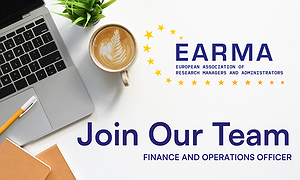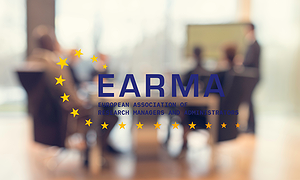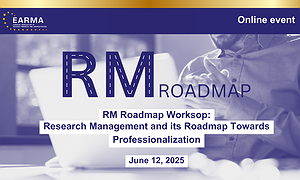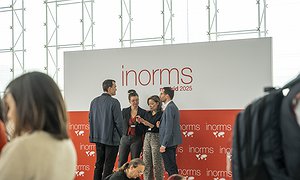As a follow-up to our previous article informing you about the potential of Action 17 for the RMA (research management and administration) community in Europe, we wanted to provide you with further insights on the importance of ensuring that every European Member State supports it. By providing two case studies from France and Ireland, we aim to show what the process of implementation could look like.
RMAs and European Research Policy
In our community, we have noticed wide interest in following the path of implementation for Action 17 because of the large-scale impact it would have on enhancing the RMA profession's recognition and professionalisation in Europe.
Action 17 is an item on the policy agenda of the new European Research Agenda (ERA). The ERA was initially set up in 2000 and was revitalised in 2020 as the “new ERA”. It was then adopted by the European Council, which put forward a new governance structure for the ERA. This new ERA comes with its own policy agenda consisting of 20 individual actions to develop the European Research Area, one of them being Action 17.
Action 17 is tailor-made for the needs of the RMA community in Europe. It reflects the EU's intent to strengthen the strategic capacity of Europe's public research performing and funding organisations. In practice, this means that the EU aims to respond to and develop solutions for the issues that research managers and administrators in Europe face: the uneven distribution of RMA networks and expertise across Europe, the need for training, new skills, networking opportunities and the lack of recognition of the profession of research managers, research administrators or research support staff, to name a few titles.
At this stage, it is key to highlight that by addressing the RMA community in the new ERA policy agenda, this has already elevated the RMA profession to some degree. Definitions of the RMA profession need to be as inclusive as possible due to the breadth of terminology and titles that those working within it hold. By defining this community of individuals as a larger group, the currently fragmented and underrepresented professional RMA spectrum stands to have a stronger voice at the highest political levels.
While Action 17 is the flagship policy item for RMAs, the community is also represented in other actions, such as Action 4 which aims to promote attractive and sustainable research careers. Most importantly, the presence of strong research management is crucial for the success of the New Era overall, as our community will guide the realisation of all the other actions.
The implementation of the New ERA & Action 17
The actions will be implemented jointly by the European Commission and the Member States who have subscribed to the actions on a voluntary basis. The new ERA will be developed through projects, which are guided by detailed policy goals and milestones which are specified for each of the 20 actions. In practical terms, this will help guide the projects that will put the proposed goals into action. To ensure shared responsibility and ownership for these projects, the Member States are invited to sponsor certain actions.
During 2023, the ERA Policy Online Platform will be made available to offer an overview of the implementation process of the ERA and the ongoing activities of the Member States and the relevant stakeholders.
Action 17, the policy item specifically focusing on RMAs, is being sponsored by the Hungarian and German governments. In order for an action item to be implemented, a certain threshold has to be met: 14 Member states need to support an action for it to be implemented with the help of the European Commission. It is possible that Action 17 will meet this threshold in the coming weeks, but with many Member States remaining hesitant.
The reasons behind the hesitation of the remaining Member States to subscribe to this action are primarily that research management is perceived to be a niche topic that some government departments are less familiar with. An additional apprehension lies in the expectation that subscribing to this action would lead to significant financial commitments. Action 17 is also just one of many policy items on the new ERA, and this might have led Member States to believe that they could take up implementation at a later stage.
It is probable that support for this action will increase significantly as the understanding of the value of RMAs improves on the side of the Member States that have not yet taken up this item. A task force will be established to organise the push for implementation through a series of pilot projects. In the first and second quarters of 2023, it is likey that the remaining Member States’ research and innovation departmental representatives will be invited to join a workshop, during which the RMA community will be able to communicate the added financial and strategic value that these Member States stand to gain from supporting Action 17. Many policymakers are not yet aware of the financial support that the European Commission will make available for Member States in support of the action. Moreover, the crucial role of strong research support systems for the overall success of the new ERA has not been recognised by all Member States. By connecting national representatives with the RMA community, the task force aims to reduce hesitations and communicate the essential value of RMAs for a thriving European research landscape.
RM Roadmap
Action 17 is not the only policy development that is in the pipeline for the RMA community. The European Commission has further demonstrated its commitment to supporting the recognition and professionalisation of RMAs in Europe through its funding of the RM Roadmap project and its sister project, CARDEA.
As a European association, EARMA is focused on European research policy and we are delighted to be working with our partners on RM Roadmap in the role of coordinator.
RM Roadmap will deliver a consultation process that seeks to drive the recognition and inclusive development of the research management community in Europe. EARMA will jointly provide the project through collaboration with our partners, it will be conducted over 36 months and is funded to the amount of €1.5m. The overarching objective of the RM Roadmap is to identify and adapt the research management capital base of the EU, including the widening countries, and emerging needs of its current and future research management workforce to improve the EU’s competitiveness and sustain its economic performance.
Eight European partners are working together on RM Roadmap: European Association of Research Managers and Administrators (Belgium); HETFA Research Institute (Hungary); Nova University Lisbon (Portugal); Association of European Science & Technology Transfer Professionals (Netherlands); Crowdhelix Limited (Ireland), The Cyprus Institute (Cyprus) and associated partners Janssen Pharmaceuticals (J&J) and Una Europa (Belgium).
The success of RM Roadmap will be determined by the involvement of the entire research management community. A smart community platform will allow existing European networks to connect and inform an entirely unprecedented consultation process. This co-creation process will gather the existing communities and expand upon them to reach two main objectives - To create and inform a bottom-up consensus on the future of RM in a roadmap, and to inform the community about existing training, networking, funding, and career mobility opportunities.
CARDEA
CARDEA is the sister project of RM Roadmap and is striving to strategically empower the RMA profession by training and enhancing the role of research managers. They plan to use community-sourced insights to later inform the development of a Research Manager Framework and complementary policy for consideration by the European Commission. The project is conducted by the University College Cork, Ireland, which points to the deep commitment of the RMA community in this Member State.
Case Studies: The Recognition of Action 17 in France and Ireland
We have provided two case studies to showcase what national pathways to implementation could look like in your Member State.
In France, implementing Action 17 would underline the strong French research ecosystem. It has deep synergies with existing initiatives in France that aim to strengthen human resources in support of calls for European projects and continued education.
Despite the significant presence of RMA professionals in France and its representation in EARMA, there is no unique network for this community and research support professionals are not as recognised as they are in other countries. The different business networks in the sector focus on specific aspects of research business, project engineering and valorisation of research, but not on the RMA profession as a whole. This means that there is high potential for a successful and impactful French national network of RMAs on the model of the networks which already exist in Europe, such as the Danish association DARMA. It would encourage the participation of these French professionals in European initiatives to strengthen their professional positioning and improve their integration into business networks.
The recognition of Action 17 also stands to benefit the Irish research ecosystem. More specifically, Action 17 would support Ireland in maintaining and developing competitive research talent. It would further underpin existing Irish research strategies at both the national and international levels. Ireland has already pledged to take 10 of the new ERA actions onboard. Ireland has a strong position in pan-European thought leadership (such as representation within EARMA and coordination of the CARDEA project) and signing up to Action 17 from the outset would enable Ireland’s participation in the design and decision-making phase of the policy implementation. Like in the French case, collaboration with other EU Member States and the European Commission will enhance Ireland’s position as a player in the international research landscape. The Irish RMA community has recommended that, like in Austria, an informal research and innovation management working group should be established to ensure that they have a seat at the table.
As we eagerly await the announcement determining whether Action 17 has met the threshold to be implemented, we would like to say thank you to everyone who supported the campaign. Your submissions, representations and interactions will be crucial in ensuring its success. EARMA will inform the community in the coming weeks of the outcome and let you know what the next steps will be to make Action 17 happen.

 All news
All news



